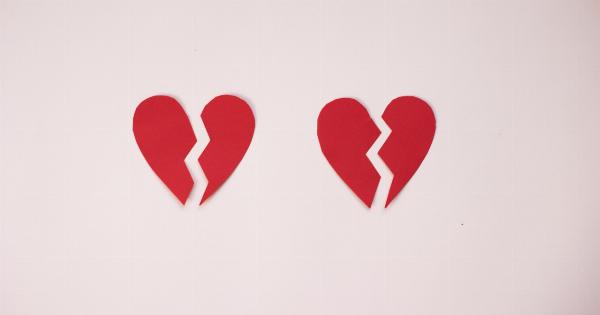Breakups can be a difficult and emotionally-charged experience. Whether you saw it coming or not, the end of a relationship can leave you feeling hurt, angry, sad, and confused. However, it is important to remember that you are not alone.
Millions of people experience breakups every year and while it may feel like the end of the world, there are evidence-based strategies that can help you overcome the pain and move on.
1. Acknowledge Your Emotions
The first step in overcoming a breakup is to acknowledge and accept your emotions. It is okay to feel sad, angry, hurt, or a mix of different emotions. Allow yourself to feel these emotions and don’t try to suppress them.
It is important to grieve the loss of the relationship and give yourself time to heal.
2. Practice Self-Care
Breakups can take a toll on your physical and emotional health, so it is important to practice self-care.
This may include exercise, healthy eating, getting enough sleep, practicing relaxation techniques such as meditation or yoga, and engaging in activities that bring you joy and fulfillment.
3. Focus on the Positive
While a breakup can feel like a major setback, it can also provide the opportunity for growth and self-improvement. Try to focus on the positive aspects of your life, such as your personal strengths, accomplishments, and supportive relationships.
Take time to set new goals and focus on building the life you want.
4. Stay Connected
Even if you feel like isolating yourself, it is important to stay connected with the people in your life. Reach out to friends and family for support and social interaction.
Join a support group or talk to a professional counselor if you need additional support.
5. Avoid Unhealthy Coping Mechanisms
It may be tempting to turn to unhealthy coping mechanisms such as alcohol, drugs, or rebound relationships to numb the pain of a breakup. However, these strategies are ultimately not effective and can lead to further emotional and physical damage.
Instead, focus on healthy coping mechanisms such as the ones already mentioned.
6. Learn from the Experience
Breakups can be a learning experience and provide valuable insights into what you want and need in a relationship. Reflect on the relationship and what you learned from it.
Take this knowledge and use it to guide you towards healthier relationships in the future.
7. Practice Forgiveness
It can be difficult to forgive yourself and your ex-partner after a breakup, but it is an important step in healing. Forgiveness can help you let go of anger, resentment, and hurt, and move on from the relationship.
This does not mean that you have to reconcile with your ex-partner, but rather it is a way of releasing negative emotions and moving on with your life.
8. Give Yourself Time
There is no set timeline for healing after a breakup. Give yourself time to grieve and heal at your own pace. Be patient with yourself and remember that it is a process.
9. Seek Professional Help if Needed
If you are struggling to overcome a breakup on your own, seek the help of a professional counselor or therapist. They can provide you with strategies for coping with difficult emotions, as well as guidance on how to move forward with your life.
10. Remember That You Are Not Alone
Finally, remember that you are not alone in your experience of a breakup. Millions of people have gone through similar experiences and come out the other side stronger and more resilient.
Reach out for support when you need it and remember that it is possible to overcome the pain of a breakup and move on to a happier and healthier future.



























